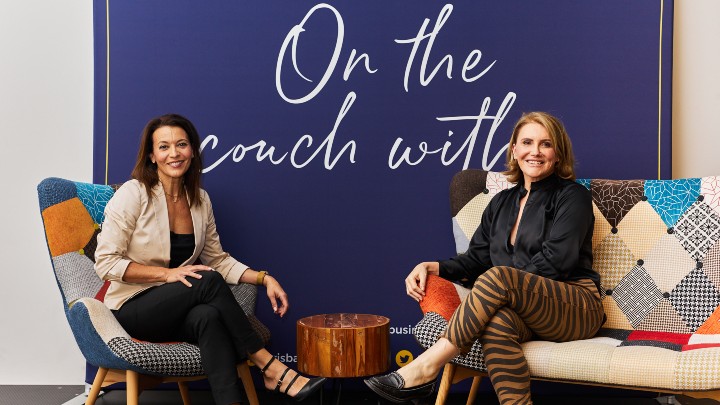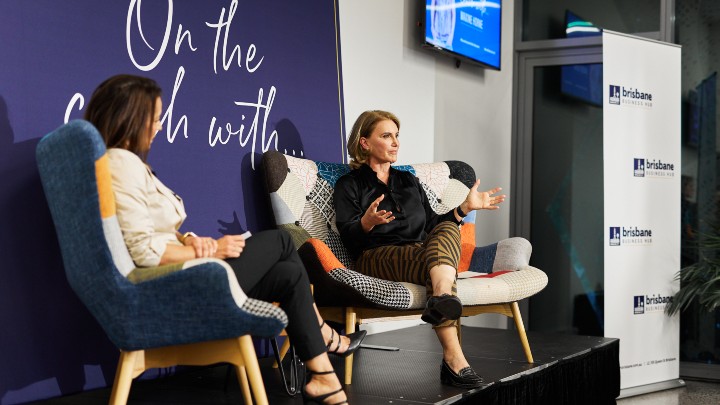In 1995, Maxine Horne started a mobile phone store in Pacific Fair with $3000. Today, she leads an empire that turned over more than half a billion dollars in the last financial year. Here’s how she did it.
Maxine Horne is the founder and CEO of Vita Group. Since launching with one Fone Zone store in 1995, the Brisbane businesswoman has guided the group’s growth in information and communications technology through Vita’s operations of Telstra’s stores and its own Sprout accessories brand, and its recent evolution into skin health and wellness through its Artisan Aesthetic Clinic brand.
The group currently operates in more than 130 locations, with a team of 1,600 and revenues of $773.1 million in financial year 2020.
An inductee into the Businesswoman’s Hall of Fame, Maxine received The Courier-Mail Award for Business Person of the Year at the Lord Mayor’s Business Awards in 2019, among numerous other awards in a storied career spanning more than 25 years.
Not bad for a $3000 investment.
Speaking at the Brisbane Business Hub’s latest On the Couch event, Maxine shared the six guiding principles that have been the keys to her success. Here, in her own words, are six lessons to live by.
Define, refine, share and execute your strategy
It’s really important to have a plan and be able to communicate it. What I did wrong in the early days was I had the plan in my head, and I was working to that plan, but no one else knew what I was talking about.
You have to define it, write it down and communicate it constantly. Don’t just put it in a drawer and forget about it. And it can’t be cast in stone, because the environment that you’re working in isn’t cast in stone. We’ve all seen that over the past year. You have to change your strategy, but when you make those tweaks, get it back in writing, recommunicate it, and then constantly remind your people that’s where you’re going.
You can have the best strategy in the world, but if you can’t execute it, it’s not worth anything. And you’re not the person executing it – your people are. So it’s important that your team understand what you want, and you continually inspect what you’re expecting.

Put value in your values
Your values set the culture of your organisation. They’re the rules by which you insist on playing the game. And as the leader, if you’re going to have values and you’re going to document them, you have to live by them. Because people don’t listen to what you say, they watch what you do. And the standard you walk past is the standard you accept.
If someone’s doing something that’s against your values, you have to take action. If prompt attendance is one of your values, for instance, and someone is constantly turning up to work late, and you don’t raise it with them, then you’re effectively saying that’s okay. And before you know it, the whole organisation will be coming to work 15 minutes late.
You have to bring your values to life. They can’t just be a plaque on the wall. Years ago, we had an employee who was our top salesperson by a country mile – selling three times as much as the next person – and he got caught taking $20 from the till.
I had an area manager fly down to me and practically beg me not to terminate him. I passed our values over to him, one of which is ‘Always do the right thing’, and I said, “If I do what you’re asking me to do, I have to cross off a value. I want you to think about what you’re asking me to do and come back in a couple of hours.”
He came back and he said, “Okay, I get it”. All he was thinking about at the time was that he was going to lose a really high-performing salesman. But I can guarantee you, if I found out about the $20, everyone in the business already knew about it. And if I didn’t do anything, then effectively, I’d have been saying it was okay to steal from the till.
So you have to put your values into action. Sometimes it’s going to send you into a pit, and you’ll have to climb back out of it, but if you want to have those values… well, you have to value them.
Put your people first
Don’t get me wrong – I love my customers, and no business can survive without them, but if you don’t look after your people and you don’t treat them with respect, how can you possibly expect them to look after your customers?
For me, it’s about making sure performance is monitored, measured and rewarded. That reward doesn’t have to be financial – it can be something as simple as a thank you, an acknowledgement, or putting them on an exciting project team.
You also need to be able to give your people autonomy. This is the downfall of so many small business owners. You’ve selected the right people, you’ve given them the trajectory they need to be on, you’ve given them the skills they need to do the job, and then you micro-manage the hell out of them. And then what do they do? They leave, and they take all of those skills somewhere else.
It took me seven years, at least, to get past the urge to micromanage. Now I’m the queen of delegation. It’s really important, because no matter how good you are, there are only 24 hours in a day. In giving your people autonomy, you have to accept they will never, ever care about it as much as you do or do it as well as you do. They’re not going to put their blood, sweat and tears into it like you do, because it’s not their business.
But you have to do the math – if you’ve got 10 people that do it 70 percent as well as you would do it, that’s still seven times better than what you can do by yourself. That’s how you’ve got to think.

The customer is king queen
We’re a very customer-centric business. We’re constantly asking ourselves, are we still relevant? Are we still offering the right treatments, the right service, the right products? Are we doing it in a manner that customers expect? Are we attracting the right people?
This even extends to people coming to us for job interviews. I always get annoyed if we haven’t gotten back to applicants in a certain amount of time, because those applicants are also potential customers.
I’ll always remember, about 18 months into the business, when we had around 14 Fone Zone stores, I went out shopping. I wanted some mascara – Lancôme Definicils. It was quite an expensive brand at the time, but I knew what I wanted, so I walked into a department store and I went to the counter, and the salesperson was on the phone. It was quite obvious that it was a personal phone call.
I made it clear I was waiting, and she finally looked over at me. I said, “I’d like to buy something”, so she said to her friend on the phone, “I’m just going to put you on hold and I’ll come back, I’ve got a customer”. This started to get my hackles up.
She asked me what I wanted, and I told her. She looked it up on her computer, and she said, “Oh, it’s out the back”.
An awkward pause.
“Oh, you still want it?”
“Yes. I do.”
She went and got it and came back. And I did a mean thing – I let her ring it up, and when she went to get the money from me, I said, “Look, I’ve changed my mind, I don’t want it anymore. But I need you to know why I’m not taking it. It’s not because of your fit-out, it’s not because it’s not the right product, and it’s definitely not price. The only reason I’m not buying it is because of how you just treated me. And you need to go and tell your manager that.”
Now, I know she didn’t do that. But I walked away thinking, “Is that happening in my stores?” And I had no idea. That’s why we introduced our customer-centric program, ‘Customers Are Really Everything’. We got the teams together and discussed ways to wow our customers. We came up with things like a kids zone, and charging the phones in the store – remember, this was back in the days when you had to buy a phone and then charge it for days to get the full use out of your battery.
These were little things that didn’t cost us a lot of money, but did require resources and commitment. The promo had to be owned by our people. From that day on, it’s been quite ingrained in our business that we have to remain customer-centric.
Look over the fence
You’ve got to keep an eye on your competitors, and keep an eye on the rest of the world, too. What are other countries doing? As an organisation, we’re continually monitoring the activity in our category, not just in Australia and Asia Pacific, but around the world.
When we were developing the Artisan Aesthetic Clinics, I analysed Brazil, South Korea and Europe, because they tend to be ahead of us, trend-wise. There were learnings from that analysis that I was able to pitch to our board that helped get the concept over the line.
If you’re in Australia, chances are that someone, somewhere in the world, has done what you want to do, so keep looking.
Grow yourself
I’m not tertiary-educated, but I love education. As human beings, the thing that sets us apart from animals is that we are always looking to learn something. It may be in the workplace, it may be at university, it may be something like learning to surf or play the guitar. But we always want to learn.
I’m very passionate about self-reflection. I go for a walk at the end of every day for about an hour and a half, and I don’t do it because I’m crazy about exercise. I do it so I can think back on the day – how did it go, and what could I have done better? You can’t go into running a business thinking that it’s going to be perfect, because it won’t be. No matter how good you are, you will make mistakes. You just have to learn from them. I think life is a long journey of self-education.
It’s about working out how you learn. I learn from reading, and I love talking to businesspeople and understanding how they’ve done things and understanding their viewpoint. If the Brisbane Business Hub had been here when I was starting my business 26 years ago, I’d have been here hassling the hell out of everybody. “How do I do this? How do I do that?” This is a great opportunity.
The Brisbane Business Hub is a space for businesses in Brisbane to find advice and learn the skills to sustain and grow their business – across all industries. Visit the Hub in-person at Level 2, 155 Queen Street, Brisbane City, or explore our virtual Hub.





























